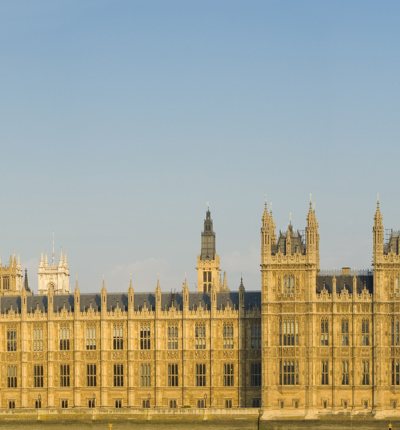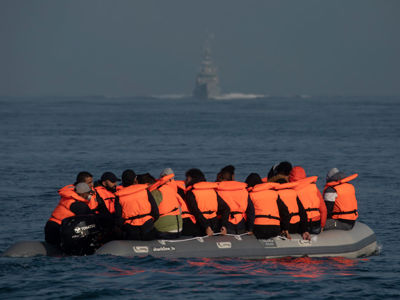
Nationalities and Borders Bill would close UK to people fleeing war in Ukraine
Ukrainian people who want to take refuge in the UK may have to take their chances with people smugglers under current laws, and under the impending Nationality and Borders Bill they could be liable to prosecution and may be returned to the first country they arrived in after fleeing the war.
Posted on 10 March 2022
Unless the Government acts quickly to change the entry and visa requirements for Ukrainians who need to take refuge in the UK, only those who match its strict criteria will be able to travel here to stay with family members.
The legal opinion, provided by Raza Husain QC, Alasdair Mckenzie and Sarah Dobbie, commissioned by Good Law Project through law firm Leigh Day stresses that the only means by which people fleeing Ukraine can currently lawfully travel to the UK is by obtaining a visa under existing immigration routes. No refugee or humanitarian visas are available to people wishing to come to the UK.
At present visas for three years’ residence are available to those eligible under the Ukraine Family Scheme, full Guidance for which has not yet been published. A humanitarian sponsorship pathway will offer leave to stay in the UK for 12 months but the details of this are also still unclear. Other existing visa schemes are the Seasonal Worker Visa and the Standard Visitor Visa, which allow access to the UK for up to six months but are not fit for purpose as they were not designed with the need to seek refuge in mind. All visas must be obtained from Visa Application Centres, which now only exist across international borders from Ukraine.
Those who attempt to arrive without a visa may have to resort to people-smugglers, may be at risk of prosecution on arrival, and will be liable to detention. If they do manage to get to the UK, they may be ineligible to work, eligible for “asylum support” only if they are “destitute”, and at the back of an unprecedented backlog in asylum claims.
Currently the Government is working to reset controls on immigration through The Nationalities and Borders Bill, which the legal opinion highlights is unquestionably “the single biggest legal assault on international refugee law ever seen in the UK” and divides refugees into two groups, those who will have arrived in the UK without travelling via another country and those who will have stopped off elsewhere. It is argued this authorises discrimination and is “an extraordinary and flagrant re-writing of the Refugee Convention”.
It is widely held that the Bill, currently at Report Stage before the House of Lords, violates the UK’s obligations under international human rights law and international refugee law, and is inconsistent with the common law. This at a time when the UNHCR has stated that Europe is facing the “fastest growing refugee crisis since the Second World War”.
The Joint Legal Opinion sets out the way in which the Bill would impact a Ukrainian seeking refuge in the UK if it became law: a Ukrainian seeking asylum, unable to obtain a visa and crossing third countries in the absence of direct flights to the UK may be “pushed back” if she attempts to arrive via boat; will be criminalised; may well have her claim declared inadmissible; may be removed for off-shore processing; and will be designated a “Group 2 refugee”, and provided with inferior treatment and protection.
An individual who is unable to obtain a visa but manages to reach the UK will have committed an offence – the very act of arriving in the UK to seek asylum will be criminalised. At present an individual who arrives at the UK border and presents herself to immigration control (including for the purpose of seeking asylum) is not deemed to have entered the UK until the point that she has passed through immigration control and crossed the border.
It has long been recognised that some element of choice is open to refugees about where they can claim asylum. The Refugee Convention states that states “shall not impose penalties” on refugees so long as they came “directly from a territory where their life or freedom was threatened”.
However under the Bill, an individual will be deemed not to have come to the UK “directly” — and thus not immune from penalties — if they have “stopped” in another country on their way from the country where they were fleeing persecution, and could reasonably be expected to have “sought” protection in that country.
There are currently no direct routes to travel from Ukraine to the UK, so any individual who arrives in the UK from Ukraine must have stopped in at least one country on the way here. If the Bill becomes law, any individual who does that, and who arrives in the UK without a visa, will be liable to penalisation because of their unlawful arrival.
The legal opinion explains that there is no basis for this approach in international law and it is at odds with the requirements under the Refugee Convention (Article 31(1)).
The legal opinion quotes Lord Etherton, the former Master of the Rolls, who recently observed that: “Quite simply, it is not possible for any Ukrainian to come “directly” on the Government’s interpretation. In seeking to reinterpret Article 31(1) in the way that it does, the UK will wrongly deprive asylum-seekers of one of their most fundamental rights and turn its back on all other States working to uphold the international protection framework.”
Leigh Day human rights specialist, partner Tessa Gregory said:
“The legal opinion commissioned for our client the Good Law Project makes plain that the Home Secretary urgently needs to act to ensure that the UK can provide safe refuge to individuals fleeing the war in Ukraine. The current immigration system is not fit for purpose and the system envisaged under the Nationality and Borders Bill will make things worse and place the UK in flagrant breach of the 1951 Refugee Convention.”
Jolyon Maugham, Director of Good Law Project said:
“Government policy serves two masters. It minimises – to a point that breaches international law – our obligations to families fleeing the invasion in Ukraine. And it does so in a way that tries to minimise the political cost of this stance which the public does not support. I am grateful to our legal team for exposing this ugly duality.”
Good Law Project is represented by Tessa Gregory and Carolin Ott of Leigh Day, and Raza Husain QC of Matrix Chambers, Alasdair Mackenzie of Doughty Street Chambers, and Sarah Dobbie of 5 Essex Court.




